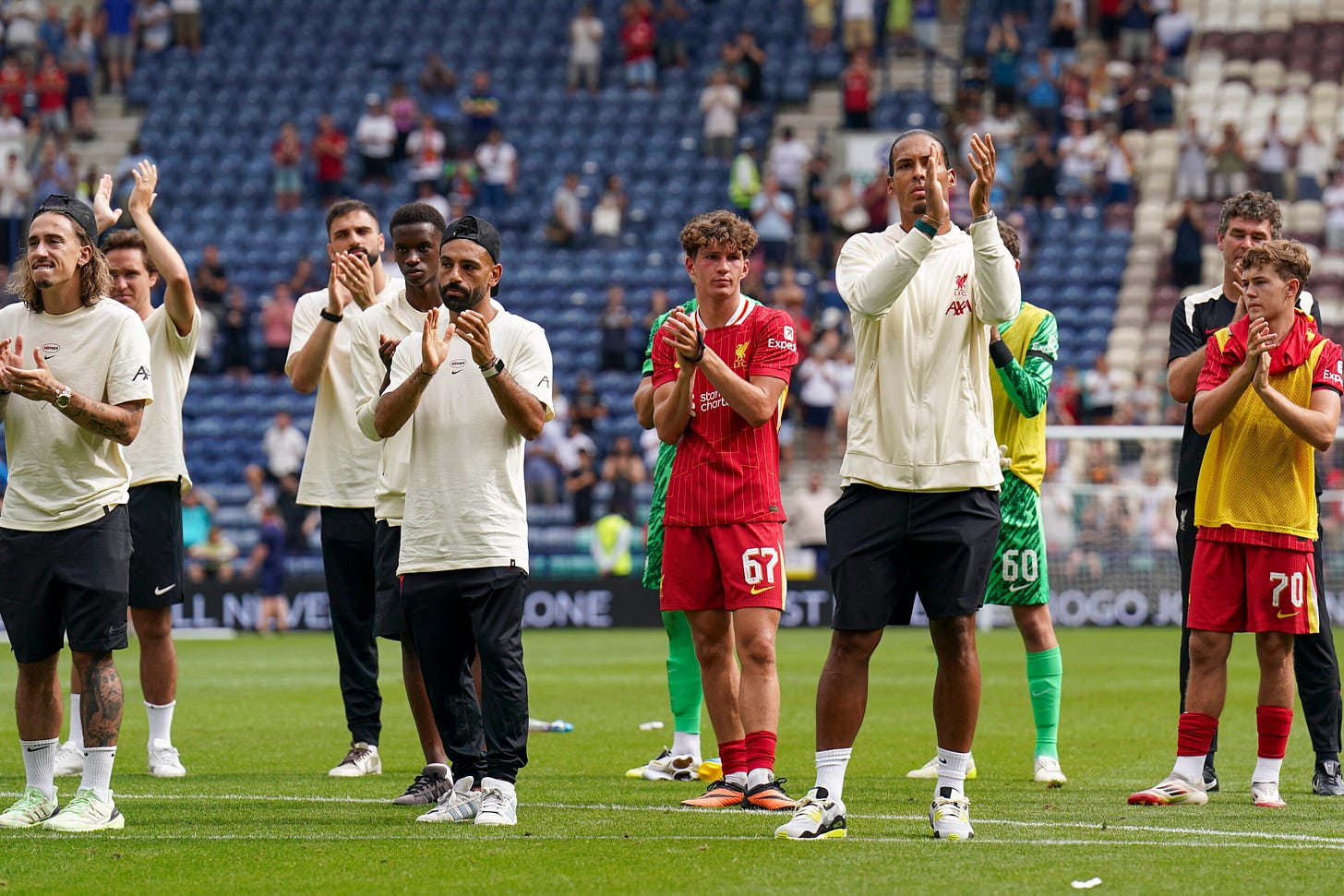Liverpool and Preston Showed Football’s Power to Heal
The Grief That United Us All
Liverpool’s first pre-season match against Preston North End ought to have been an exercise in tactical curiosity, a glimpse at sharpness, excitement for new faces, hunger and preparation. Instead, it became something more profound. It was not about formations, line-ups or final scores. It was about Diogo Jota. It was about André Silva. It was about the staggering emotional weight of lives cut short and the echo they left on the terraces.
At Deepdale, the home of Preston, football returned wearing the black armband of grief. The match took place ten days after the tragic accident that claimed the lives of two brothers, and yet, rather than dissolve under the pressure of such sadness, the day found a strange and powerful beauty.
Liverpool fans were not spectators; they were participants in something far more solemn. From the moment “Oh, his name is Diogo” rang out twenty minutes before kick-off, it became clear this was not a normal friendly. In those moments, football was not a game; it was a language of loss, and we all understood it.
After the final whistle, the Liverpool players did not walk off. For seven long and meaningful minutes, they stood in front of the Bill Shankly Kop and clapped in unison with supporters. There was no choreography to it, no PR spin or media obligations. It was just human beings recognising one another’s pain, holding it, and giving it the weight it deserved.
Preston’s Dignity, Football’s Humanity
Much will be said about what Liverpool did that day, and rightly so. But credit must also go to Preston North End and their supporters, who helped create a moment bigger than the match. Their captain, Ben Whiteman, walked out alone before kick-off to place a wreath before the away end, his gesture as quiet as it was powerful. “You’ll Never Walk Alone” was not just a song on the day, it was a covenant. It was sung as if the stadium itself needed to be reminded that life, however fragile, was still worth singing for.
There is no guidebook for what football clubs should do after such a tragedy. But what unfolded at Deepdale felt instinctively right. Images of Jota and Silva in their Porto days beamed from the big screen, while flags of Portugal danced alongside scarves and shirts. Some supporters wept, others stood still. Some sang, others simply nodded their heads and closed their eyes. There was no script, and that is what made it matter.
Darwin Núñez honoured his fallen teammate with celebrations lifted from Jota himself. The “Baby Shark” for his children, the “gamer” pose that had gone viral, both were reenacted without irony, without self-consciousness. He pointed to the sky. Cody Gakpo followed suit. None of it looked rehearsed. It was raw and spontaneous. In a world that rushes to monetise grief, this felt refreshingly untouched.
Grief Shared Is Still Grief
Watching it unfold, what struck me most was how many fans did not try to act right, they just acted honestly. Some sang Jota’s name every time the ball rolled near the number 20 shirts. Others stood silent, looking lost in their own private moments. Some fans chose to mark the 20th minute, others didn’t. There was no rulebook, no uniform way to express what Jota meant. That, perhaps, was the truest tribute of all, the freedom for each person to grieve in their own way and in their own time.
Football is often accused of being tribal, hostile, disconnected from real life. But when things like this happen, the mask slips, and the game’s real soul shows itself. Not in the stats or the tactics, but in the embraces outside the ground, in the scarves held by strangers, in the way the fans of one club clap for the grief of another.
What Preston helped foster yesterday was a sanctuary. Not just for Jota’s family and teammates, but for every one of us who has ever stood at a match and thought about someone we lost. In those shared silences and roars, something unspoken passed between us.
More Than A Scoreline
Liverpool won 3-1. There were goals, promising signs and strong performances. The pundits spoke well of young Rio Ngumoha, and rightly so. There were crisp passes, clean tackles and smart link-ups. But none of that felt as important as it usually does.
Even after the final whistle, the focus rarely drifted to the result. What lingered instead was the emotional weight carried by everyone present. The sense was clear; for many, the scoreline mattered far less than simply being there, sharing space, memory and meaning. Being back in the rhythm of football brought a kind of comfort, but never at the expense of remembering what had been lost.
That tension is difficult to hold. How do you go back to the rituals of football, the anger at a bad decision, the joy of a great goal, when something so much bigger is hovering above it all? There is no answer. There should not be. One day you will cheer again, the next you might cry when a song is sung. That is what grief looks like in public.
We saw something at Deepdale that cannot be easily described. It was a kind of footballing vigil. It was remembrance held not in a church, but in a ground that roared and paused in equal measure. And while some analysts will pour over the minutes, the performances, the preparation for the season to come, some of us will remember it for an entirely different reason.
Because sometimes football is just football, and sometimes, it is the only place we know how to cry.



You captured it perfectly.